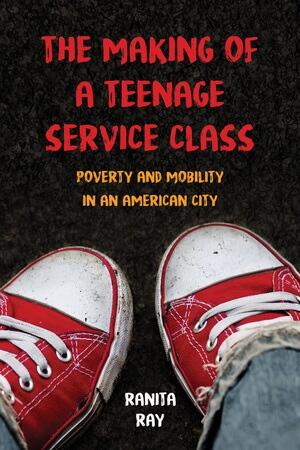The key to alleviating generational poverty might be radically changing how we think about race and class, not modifying individual behavior. Ranita Ray makes the case for this in her 2018 book, The Making of a Teenage Service Class: Poverty and Mobility in an American City.
The assistant professor of sociology spent three years conducting an in-depth ethnography of impoverished youth in a northeastern city. There, she found that despite working multiple jobs, enrolling in college courses, abstaining from using drugs, and delaying parenthood, many of the youth she studied remained stuck in low-wage, dead-end jobs.

And programs designed to help them fell far short, with a myopic focus on drug, gang, and teen pregnancy prevention, Ray said. She posits that policymakers, nonprofits, and schools should funnel the millions they’ve invested in prevention programs instead to educational and support services that help youth navigate challenges such as food insecurity, affordable housing, health care, and transportation.
Here, she discusses how changing the systems and structures oppressing black and brown youth could help pave smoother pathways to upward mobility for them.
How is your book different from other ethnographies about the urban poor?
I tried to shed new light on very old questions about how poverty is reproduced from one generation to another. The majority of ethnographies on the urban poor focus on the usual sensational topics like drugs, gangs, violence, and teen parenthood, arguing that targeting these risky behaviors is central to challenging the reproduction of poverty. I make the point that focusing on these behaviors is actually causing further harm to marginalized communities and reproducing racial and class hierarchies. Those doing everything right and “playing by the rules” clearly demonstrate that the system is actively functioning to marginalize some. Changing individual behavior is not the answer. We need to radically alter how we think about class. So I ask entirely new questions like, how does this moral and public health panic around teen pregnancy impact black and brown youth? How do marginalized families experience familial bonds while depending on one another for resources? How do ambitious youth become low-wage service workers?
You describe marginalized youth as having a deep unfamiliarity with middle-class cultural capital such as technology. How does this create barriers to access to higher education and upward mobility?
Many of the youth in my study did not grow up with laptops. They struggled to navigate the internet and type quickly. Often, they needed to use the library to complete college assignments, but they had to work after their classes, and by the time they finished, the library was closed. Besides technology, the youth also were not familiar with the intricacies of higher education, which often excludes marginalized people. So the only way for these ambitious black and brown youth to make more money was to put in more hours at work. Employers often refused to hire them full time to avoid offering them benefits. So the youth had to manage classes with work and other responsibilities while traveling long hours — often hungry — between home, school, and work. Their long-term trajectory was made of these everyday moments of exhaustion, disappointment, and hunger.
How can we change the narrative about and existence of urban poverty?
To really understand and challenge the social reproduction of poverty, we need to understand how underfunded schools, underemployment and unemployment, racism, low minimum wage, etc., are holding youth back. We need to challenge these structures instead of pretending that risky behavior prevention among “problem kids” is the answer. It is not. Every community uses drugs at the same rate; that’s just one example.
What do you hope your work will accomplish?
I hope that my work will help create new directions in poverty studies by challenging white masculinist perspectives that have largely ignored how critical race theories, feminist perspectives, and sociology of education and work can shape the study of poverty. I hope to inform public policy around how black and brown bodies are constructed as social problems to be solved and how this narrative shapes the ways in which we understand economic marginalization and attempt to alleviate it. What we need is an overhaul of the system. We need to allow black and brown youth to lead. I think it’s important to be angry, to think about larger change, and to feel responsible for those who come after us.



